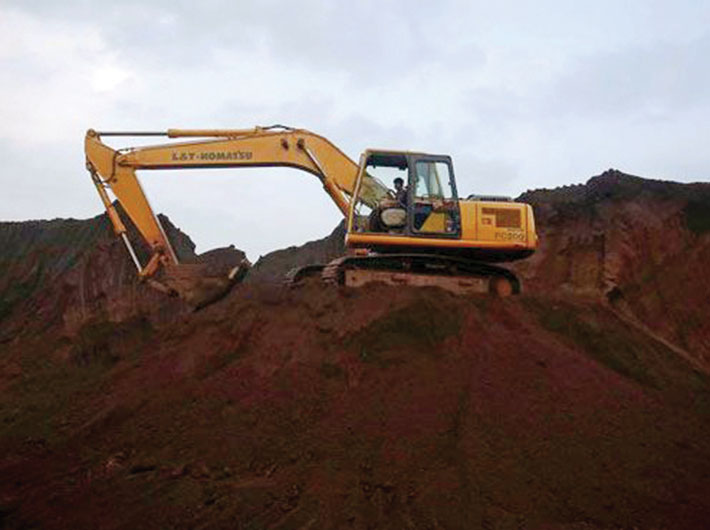Stung by the damning disclosure of Rs 60,000 crore loss due to illegal mining, state explores the option of e-auction
It seems to be a classic case of closing the stable door after the horse has bolted. But those who see life as glass half full might yet see in it a silver lining. Stung by the Shah commission’s damning disclosure of '60,000 crore loss as a result of illegal mining in the state, the Odisha government is hurriedly putting in place mechanisms for e-auction for sale of minerals in line with the Supreme Court’s judgment on iron ore mining in Karnataka.
Officials said the Odisha government is planning bidding of future mining leases through e-auction and modify laws to reduce ‘supernormal margins of entrepreneurs who take undue advantage of the existing law’. The existing law does not make e-auction mandatory. The Odisha chief minister Naveen Patnaik has written to the ministry of mines, government of India, to introduce the same in the state in line with the Supreme Court order in Karnataka.
The Supreme Court vide its order of September 2, 2011, has appointed a central coordination-cum-empowered committee (CEC) to oversee the e-auction of iron ore from Karnataka. The CEC has, in turn, formed a monitoring committee to carry out the order of SC. The government run MSTC, formerly known as metal scrap trade corporation limited, has been identified to carry out e-auction through their portal. The process of the electronic auction is detailed and involves a lot of internal checks and balances. Firstly, the material ready for e-auction is identified by the deputy director of mines and geology (DDMG) from the mines under their area of control. Then the iron content from the samples collected from the mines is provided by the laboratories functioning in DMG/DDMG offices. The material thus identified and earmarked with specific iron content is parceled in multiples of 4,000 MTs for the e-auction, and each lot is allocated with an identification number. These details are provided to MSTC a week before the date of auction so that the prospective buyers would be able to visit the mine heads and satisfy themselves about the quality of the ore.
A day before the actual e-auction based on the iron content and market information, a base price is arrived at by the monitoring committee. That price is communicated to the MSTC for uploading on their e-commerce platform (portal). Prospective buyers/bidders are expected to register themselves with MSTC well before the auction. Bidders are also expected to sign the document containing terms and conditions of the e-auction and submit along with EMD before participation in the bid process. Documents duly signed by the prospective bidders are forwarded by MSTC to the monitoring committee for approval.
Once the bid documents are approved by the monitoring committee, MSTC allows such applicants to participate in the e-auction. As soon as the auction is completed, MSTC forwards the list of successful bidders to the monitoring committee and the earnest money deposit (EMD) to MSTC, post which sale intimation is sent to the successful bidders. The monitoring committee will subsequently be issuing the acceptance letter to the successful bidders giving details of lot numbers and payment details.
Successful bidders are given a specific time-frame to make payment as per the acceptance letter. As and when the payments are received, permits are generated by keying in all the details pertaining to the particular bid on the website/portal developed by N-Code, an associate of Gujarat narmada valley fertilizers and chemicals(GNFC). Based on the bulk permits issued, the lease/mine holder will be generating the trip sheet by opening the website using his password. Simultaneously, the monitoring committee will be emailing the ccanned bulk permits to the concerned forest/district/DDMG authorities for smooth flow of material from the mine head to the buyers place.
This process is aimed at greater transparency and accountability to prevent corruption and loss of revenue to the government.
In Karnataka’s attempt to clean up its act, the Odisha government sees a way out of its own mess. The government said that though it decided to implement e-auction of minerals last year, private miners stalled the move on the plea that the April 18, 2013, judgment of the Supreme Court in this regard was meant only for Karnataka. The miners argued that the state has to get a separate permission from the apex court. But the government finally seems to be having its way.
After initial resistance, Odisha’s iron ore producers agreed to participate in the proposed e-auction of minerals. The auction, like in Karnataka, was to be conducted by MSTC under the supervision of union steel and mines ministry, government of India, on a trial basis. “The mine owners were opposed to the e-auction process due to the fixing of a base price applicable to all minerals and for allocating 70 percent of the produce to local industries, allowing only 30 percent for export,” said DK Mohanty, additional general manager, sales and marketing, Odisha mining corporation. “This was expected to reduce their profit margins substantially while preventing under-quoting.”
The process was supposed to start in January 2014, after the winter session of Odisha assembly. The government, however, is awaiting the report of a team of officers from the state steel and mines department, which is currently in Karnataka studying the e-auction process to be replicated in Odisha.
Though the miners are skeptical about the process, they want to see if the new process will get them a better price. “We have agreed reluctantly to join the e-auction process on a trial basis. But our issues of old clientele base and evacuation of mineral have not been addressed properly. We are joining the process for better prices,” said Prabodh Mohanty, spokesperson for eastern zone miners’ association.
Traditionally, iron ore trade takes place bilaterally, where each buyer has to negotiate with miners for prices, thereby giving miners the opportunity to decide the rate and buyers suitable for them. Steel makers and political parties allege that miners often quote a lower price in paper to avoid paying higher royalties and other taxes and also prefer buyers from outside Odisha for extracting a better price.
Mining activities have come to a grinding halt in major mineral-bearing states like Karnataka, Goa, Odisha and Jharkhand after the Shah commission’s inquiry into illegal mining was instituted by the union government in 2010. Odisha accounts for about 35 percent of all India iron ore deposits, with production ranging between 60-62 million tonnes each year. It produces 62-64 grade iron ore lumps, suitable for making steel via direct Reduced Iron production method. It is home to some of the country’s largest iron ore mines such as Ahluwalia, Rungta and Essel Mining. It has several ongoing steel projects and several more in the works, including those of SAIL, Tata Steel, JSPL, Posco and Bhushan.
With steel industries facing acute shortage of iron ore due to various regulations, the ministry of mines, government of India, has sought views of the state government on the concept of e-auction of minerals to resolve the crisis. The cabinet, which took up the five-volume first report of the commission, decided to appoint a committee of secretaries to review the action taken on the report’s key 11 recommendations last week. The Committee’s recommendations are pending.
The contentious issue of e-auction of minerals was discussed at the quarterly meeting of the CEC on mineral development and regulation at New Delhi. The CEC did not find a solution to the raw material scarcity faced by steel companies due to the restrictions imposed on mining activities by mineral-bearing states following detection of large-scale irregularities in the mining sector.
Expressing concern over shortage of raw material to steel industries, the ministry of steel urged the CEC to find a mechanism to ensure assured supply of iron ore. The ministry of steel stressed the need to understand that raw material security through long-term linkages is an important issue for the development of domestic iron and steel industry. “In order to ensure availability of iron ore for steel sector, it is required that steel companies’ demand for iron ore should be fully met in the form of assured linkages for supply before selling iron ore through e-auction,” the steel ministry stated.
The ministry of mines, however, is of the view that e-auction of minerals has the advantages of transparency, optimum price discovery and realisation of correct royalty in the mineral bearing states. The mines ministry now plans to introduce the system in all states through the CEC.

